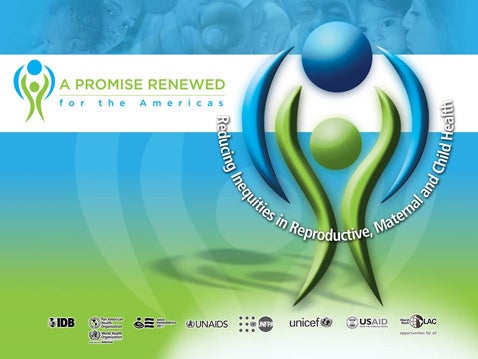Panama/Washington, D.C., 27 August 2013 — Countries in Latin America and the Caribbean have reduced maternal and child mortality significantly over the past two decades. But many mothers and children continue to die from preventable causes, particularly in low-income and marginalized populations.

To address this problem, a high-level conference is being convened in Panama City, September 10-12, hosted by the Government of Panama and organized by a partnership of seven international agencies. Its goal is to mobilize the region to rapidly reduce disparities that contribute to maternal and child mortality and to strengthen regional cooperation to improve maternal and child health.
The conference, "A Promise Renewed for the Americas: Reducing inequities in reproductive, maternal, and child health," will provide a regional forum to celebrate successes; review trends in reproductive, maternal, child, and adolescent health in the Americas; and identify key interventions and approaches for overcoming inequities in health.
Maternal and child mortality
At the regional level, maternal mortality declined 42.9% in the Americas between 1990 and 2010. But declines in maternal deaths vary substantially among countries and across social, economic, and ethnic groups within countries. Low-income adolescents have a higher risk of dying from pregnancy-related causes than teens from more privileged groups. Indigenous women, poor women, and those with limited education also face higher risks of death than women with more advantages.
The situation is similar with respect to child deaths: despite a 57.2% decline in child mortality between 1990 and 2010, children in low-income families remain five times more likely to die before age 5 than those in higher-income brackets. The majority of these deaths are preventable.
These inequalities make it difficult for the Americas to fully reach the Millennium Development Goals (MDGs) of reducing maternal mortality by 75% and child mortality by two-thirds between 1990 and 2015.
During the "A Promise Renewed" conference, participants are expected to sign a "Panama Declaration" renewing their commitment to reducing inequities in maternal and child health. They are also expected to produce a regional roadmap for strengthening coordination and resource mobilization to reduce inequities and accelerate reductions in maternal and child mortality in the Americas.
The meeting is being convened by the Government of Panama with support from the Inter-American Development Bank (IDB), the Pan American Health Organization/World Health Organization (PAHO/WHO), the Joint United Nations Programme on HIV/AIDS (UNAIDS), the United Nations Population Fund (UNFPA), the Regional Office of the United Nations Children's Fund (UNICEF/TACRO), the United States Agency for International Development (USAID), and the World Bank.
The regional conference is in follow-up to a global initiative launched in 2012 by representatives of more than 80 countries as well as civil society organizations, who called for action to improve child survival. The new global effort known as "A Promise Renewed" promotes efforts to improve reproductive, maternal, and child health. As of August 2013, 175 governments—including 32 from Latin America and the Caribbean—had signed onto the commitment. A number of other regional conferences have been held to prepare roadmaps to help countries accelerate advances in maternal and child health.
For more information visit the A Promise Renewed Americas website.
What: An international meeting on "A promise renewed for the Americas: reducing inequities in reproductive, maternal, and child health"
When: 10-12 September 2013
Where: Panama City, Panama
How: For media registration, visit this link.



